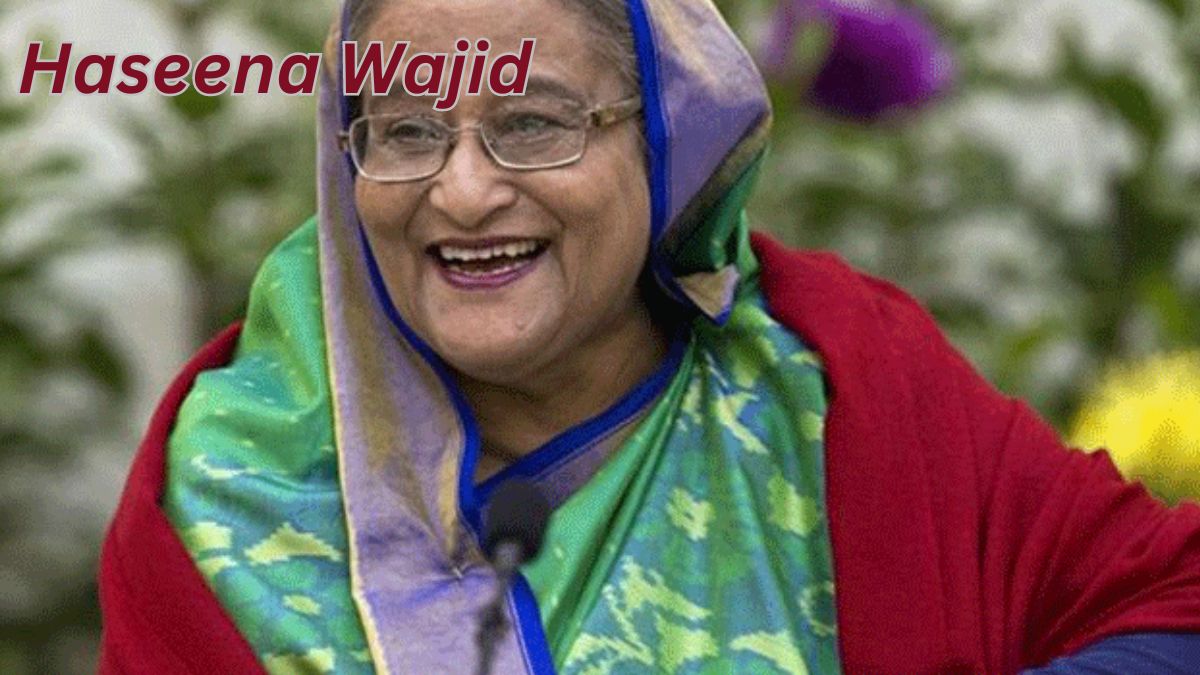In the vibrant political landscape of Bangladesh, Haseena Wajid, the country’s long-standing Prime Minister, stands as a figure of both admiration and controversy. With a political career that spans several decades, Haseena has navigated through tumultuous waters, steering the country through periods of economic growth and political unrest. This article delves into the life, achievements, and controversies surrounding Haseena’Wajid, highlighting the recent protests against her leadership and the dramatic turn of events that led to her fleeing the country amidst military intervention.
The Early Life of Haseena Wajid
Born on September 28, 1947, in Tungipara, Bangladesh, Haseena Wajid’s journey into politics was deeply influenced by her father, Sheikh Mujibur Rahman, the founding leader of Bangladesh. Haseena grew up in a politically charged environment, where the fight for independence from Pakistan was a significant part of her upbringing. Her father’s assassination in 1975 marked a turning point, propelling her into a political career to continue his legacy.
Political Ascent and Leadership Style
Haseena Wajid first became Prime Minister in 1996, and her leadership style has been characterized by strong economic reforms and infrastructural development. Her tenure saw significant improvements in healthcare, education, and women’s rights, garnering her both national and international acclaim. However, her leadership has not been without criticism. Accusations of authoritarianism and human rights abuses have marred her career, leading to widespread dissent among various factions in Bangladesh.
The Economic Reforms Under Haseena’s Leadership
One of the hallmarks of Haseena Wajid’s tenure has been her focus on economic reforms. Under her leadership, Bangladesh witnessed impressive GDP growth, driven by a burgeoning textile industry and increased foreign investment. Initiatives to improve infrastructure, such as the construction of the Padma Bridge, aimed to enhance connectivity and economic activity. Despite these successes, economic disparity and corruption remained persistent challenges.
Human Rights and Democratic Concerns
Critics of Haseena’Wajid often point to her government’s track record on human rights and democracy. Allegations of suppressing political opposition, media censorship, and extrajudicial actions have raised alarms both domestically and internationally. The controversial Digital Security Act, for instance, has been criticized for stifling freedom of speech and targeting journalists and activists. These actions have fueled protests and calls for greater democratic freedoms.
Read Also : A Heartfelt Tribute to Brad Dummer Obituary Pecatonica il Celebrating a Life Well-Lived
The Protests Against Haseena Wajid
In recent years, Bangladesh has seen a surge in protests against Haseena Wajid’s leadership. The grievances of the protesters range from economic inequality to political repression. These demonstrations have often been met with a heavy-handed response from the government, further escalating tensions. The dissatisfaction among the populace culminated in a series of nationwide protests demanding her resignation.
Military Intervention and Haseena’s Departure
The tipping point came when the military intervened, citing the need to restore order and address widespread corruption. On a fateful day, Haseena’Wajid was forced to flee the country, leaving on an army helicopter. The dramatic exit marked the end of an era and left Bangladesh in a state of uncertainty. The military’s takeover raised questions about the future of democracy in Bangladesh and the potential for a return to military rule.
The Aftermath: Bangladesh’s Political Landscape Post-Haseena
With Haseena Wajid’s departure, Bangladesh’s political landscape entered a period of flux. The military promised a return to civilian rule, but skepticism remained high. Various political factions jostled for power, and the country faced the daunting task of rebuilding trust in its democratic institutions. The international community closely watched the developments, with calls for free and fair elections to restore stability.
Haseena Wajid’s Legacy
Despite the controversies, Haseena Wajid’s legacy is a complex one. Her contributions to Bangladesh’s economic development and social progress are undeniable. However, her tenure will also be remembered for the challenges to democratic principles and human rights. As history judges her legacy, the lessons from her time in power will undoubtedly shape Bangladesh’s future.
Personal Life and Resilience
Beyond politics, Haseena’Wajid is known for her resilience in the face of personal and political adversity. The assassination of her family members and multiple attempts on her life have tested her resolve. Her ability to navigate through these challenges speaks to her strength and determination, qualities that have defined her political journey.
International Relations and Diplomacy
Haseena Wajid’s tenure also saw significant developments in Bangladesh’s foreign relations. She strengthened ties with neighboring India, fostering economic and strategic partnerships. Her government also worked towards improving relations with China and other international players, aiming to position Bangladesh as a key player in regional geopolitics.
The Role of Women in Bangladeshi Politics
Haseena Wajid’s leadership has been particularly significant for the role of women in Bangladeshi politics. As one of the few female leaders in a predominantly male-dominated political sphere, her rise to power has inspired many women to pursue careers in politics and public service. Her policies have also emphasized women’s empowerment, contributing to societal shifts in gender dynamics.
Educational Reforms and Youth Empowerment
Under Haseena’Wajid’s administration, significant strides were made in education. Programs aimed at increasing literacy rates and improving educational infrastructure were implemented, with a focus on ensuring access to education for all, especially girls. These efforts aimed to empower the youth and equip them with the skills needed for a rapidly changing world.
Healthcare Improvements and Public Health Initiatives
The healthcare sector in Bangladesh saw notable improvements during Haseena’Wajid’s tenure. Investments in healthcare infrastructure, increased access to medical services, and public health campaigns addressed critical issues such as maternal and child health. These initiatives contributed to a decline in mortality rates and an overall improvement in public health.
Environmental Policies and Climate Resilience
Bangladesh, being highly vulnerable to climate change, saw proactive environmental policies under Haseena’Wajid’s leadership. Her government implemented measures to address environmental degradation and enhance climate resilience. These policies included promoting renewable energy, improving disaster preparedness, and advocating for international support for climate change adaptation.
Technological Advancements and Digital Bangladesh
Haseena Wajid’s vision of a “Digital Bangladesh” aimed to harness the potential of technology for national development. Initiatives to expand internet connectivity, promote digital literacy, and encourage innovation were launched. These efforts sought to position Bangladesh as a competitive player in the global digital economy.
Challenges and Controversies
Despite the achievements, Haseena Wajid’s tenure was fraught with challenges and controversies. Allegations of electoral fraud, political violence, and suppression of dissent tarnished her reputation. The balancing act between maintaining control and fostering democracy proved to be a significant struggle, leading to widespread dissatisfaction and unrest.
The Road Ahead for Bangladesh
As Bangladesh moves forward, the legacy of Haseena Wajid will continue to influence its political and social trajectory. The country faces the challenge of rebuilding democratic institutions, addressing economic disparities, and ensuring the protection of human rights. The lessons learned from Haseena’s leadership will be crucial in shaping a more inclusive and democratic future for Bangladesh.
Read Also : The Remarkable Journey of Malia Manocherian Life of Achievement and Philanthropy
The Resignation of Haseena Wajid
Haseena Wajid’s resignation came on the heels of mounting protests and widespread discontent among the Bangladeshi populace. Several factors contributed to her decision to step down:
- Political Unrest: Bangladesh has experienced escalating protests against Haseena Wajid’s government, with citizens expressing dissatisfaction over economic inequality, corruption, and allegations of human rights abuses. The public’s growing frustration culminated in large-scale demonstrations demanding her resignation.
- Military Intervention: The situation reached a critical point when the Bangladeshi military intervened, citing the need to restore order and address corruption. The military’s involvement further pressured Haseena to resign, as it became evident that maintaining her position was untenable in the face of military opposition.
- International Pressure: International observers and human rights organizations have long criticized Haseena Wajid’s government for suppressing dissent and undermining democratic principles. This external pressure added to the internal calls for her resignation, creating a complex web of challenges that ultimately led to her decision to step down.
Date of Resignation
Haseena’Wajid announced her resignation on August 4, 2024. The announcement was made amidst an atmosphere of intense political tension, marking a pivotal moment in Bangladesh’s contemporary history. Her resignation set off a series of events that left the country in a state of flux, with the military taking temporary control and promising a return to civilian rule.
Where Did Haseena Wajid Flee To?
Following her resignation, Haseena’Wajid fled to Bharat (India) for safety. The move to Bharat was a strategic choice, given the close historical and political ties between the two countries. Bharat has traditionally been a strong ally of Bangladesh, and Haseena sought refuge there to ensure her personal security and possibly to regroup politically.
Conclusion
The story of Haseena’Wajid is a testament to the complexities of political leadership in a developing nation. Her tenure brought about significant advancements in various sectors, yet was marred by controversies and challenges that highlighted the delicate balance between authority and democracy. As Bangladesh navigates its future, the lessons from Haseena’s leadership will play a crucial role in shaping the nation’s path towards a more democratic and prosperous society.
Frequently Asked Questions
Who is Haseena Wajid?
Haseena’Wajid is a prominent Bangladeshi politician who has served as the Prime Minister of Bangladesh. She is the daughter of Sheikh Mujibur Rahman, the founding leader of Bangladesh.
Why did Haseena’Wajid flee Bangladesh?
Haseena’Wajid fled Bangladesh due to widespread protests against her leadership and intervention by the military, which cited the need to restore order and address corruption.
What were the main achievements of Haseena Wajid’s tenure?
Haseena Wajid’s tenure saw significant economic growth, improvements in healthcare and education, and advancements in women’s rights and digital infrastructure.
What were the main criticisms of Haseena Wajid’s leadership?
Criticisms of Haseena Wajid’s leadership include allegations of human rights abuses, suppression of political opposition, media censorship, and accusations of authoritarianism.
How did Haseena’Wajid impact women’s role in politics?
Haseena Wajid’s leadership has been significant in inspiring women to pursue careers in politics and public service, and her policies have emphasized women’s empowerment.
What is the future of Bangladesh post-Haseena’Wajid?
The future of Bangladesh post-Haseena’Wajid involves rebuilding democratic institutions, addressing economic disparities, and ensuring the protection of human rights to create a more inclusive and democratic society.





